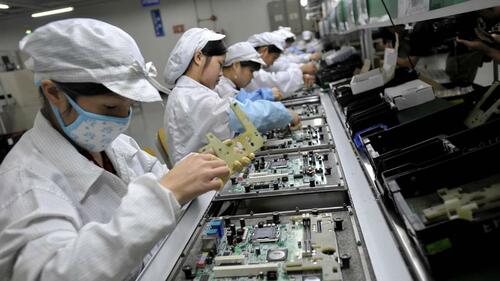Companies Draw Up Contingency Plans On Chinese Invasion Risk
Last month FBI director Christopher Wray recalled at a speaking event in London that many Western companies were caught flat-footed at the moment of Russia’s assault on Ukraine. “There were a lot of western companies that had their fingers still in that door when it slammed shut,” Wray said of the Feb.24 massive military offensive.
But then he quickly transitioned to potential parallels over simmering Taiwan tensions: “If China does invade Taiwan, we could see the same thing again, at a much larger scale. Just as in Russia, western investments built over years could become hostages, capital stranded, supply chains and relationships disrupted,” he said at the time.
And yet since that mid-July speech, the stakes and pressure have grown by leaps and bounds following House Speaker Nancy Pelosi’s August 2nd-3rd visit to Taiwan, leading a Congressional delegation as the highest ranking American official to go there in 25 years, which triggered over a week of Chinese military and live-fire exercises which encircled the self-ruled island.
Already, according to a fresh Wednesday announcement Apple is in the process of moving production of its MacBook and Apple Watch to Vietnam in a major development, though Apple and China have been inextricably linked for close to two decades. As TechCrunch details, “According to Nikkei Asia, Luxshare Precision Industry, Apple’s Chinese supplier, and Foxconn, a Taiwan-based supplier, have begun test production of the Apple Watch in northern Vietnam.”
With tensions heating up so rapidly this summer between the Washington and Beijing over Taiwan, a number of multinational and West-based companies are now hastily drawing up “contingency plans” in the event of a military conflict. This especially after Chinese state media declared that the PLA military drills were a “rehearsal for reunification” of Taiwan with the mainland.
Of these contingencies at a moment many multinationals are so deeply invested with their proverbial eggs in one basket in China, the FT observes in a new report:
The intensified planning by business leaders in the US, Europe, Japan and elsewhere is a signal that investors in China no longer consider an invasion of Taiwan to be merely a low probability “black swan” risk to the world’s second-biggest economy.
“There’s a lot of scenario thinking going on . . . all the way to: ‘What shall we do in case there is a war? Should we close our China operations? How can we sustain our business and overcome possible blockades?’” said Jörg Wuttke, head of the EU Chamber of Commerce in China.
But the problem runs significantly deeper and beyond diversifying outside of one geopolitical simmering hotspot, underscores David Mahon, a Beijing-based western investment manager and adviser. Referencing major regional companies like New Zealand dairy exporter Fonterra, he pointed to the remaining issue of…
“They’ve been advised to diversify. The question is ‘where?’ Do I just stop taking profit for the next five years? There’s nowhere to go,” said Mahon. Fonterra said it closely monitored geopolitical developments and that “China continues to be a profitable market with excellent prospects.”
Other analysts cited in the report posed the biggest looming obvious dilemma, “Is it realistically possible for the global economy to have a US-China decoupling?”
Apple reportedly in talks to make Apple Watches and MacBooks in Vietnam https://t.co/uhUkuXbABC
— CNBC (@CNBC) August 17, 2022
The contingency plans now being hotly debated in boardrooms are said to be gaming out various emergency scenarios – covering everything from having temporary supply chain alternatives in place to ways that their personnel and staff could be rapidly evacuated if hostilities break out.
Recently, a number of high profile DC-based and international consulting firms said they are seeing a sharp increase in clients seeking briefings on war risks between China and Taiwan, following US defense and intelligence leaders spotlighting the potential for conflict amid the backdrop of the ongoing Ukraine war. The general atmosphere of unpreparedness during the last February Russian invasion of Ukraine is also fueling this in large part.
Tyler Durden
Thu, 08/18/2022 – 05:45

